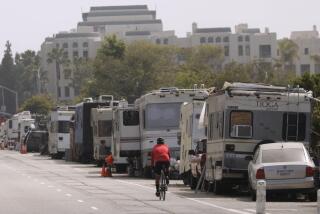Curbs OKd on Mobile Car Washers : Thousand Oaks: New city restrictions must still be approved in a public hearing. They limit operations to driveways and office parking lots.
- Share via
Stepping in to regulate cutthroat competition, the Thousand Oaks City Council has decided to strictly limit the operations of mobile car washers.
Under new regulations, which must still be approved in a public hearing, roaming car washers must confine their operations to driveways and office parking lots--and must obtain written permission from property owners before beginning work.
They would no longer be allowed to set up auto-scrubbing services in shopping malls or on city streets.
The restrictions are designed to prevent mobile car cleaners--who typically charge $5--from unfairly siphoning business from more costly drive-through carwashes.
Because most of the 40 mobile operations in Thousand Oaks do not offer workers’ compensation, and many do not carry liability insurance, they have low overhead costs. In contrast, owners of drive-through carwashes must pay for city-mandated landscaping, disabled-access remodeling and expensive waste disposal procedures.
“It is not a level playing field,” Councilman Alex Fiore said.
After the council unanimously approved the restrictions Tuesday night, both sides in the issue criticized them as half-baked--prompting Fiore to say, tongue in cheek, that the ordinance must be fair since it angered both fixed-site and mobile car washers “and totally confused the public.”
Because the proposed rules require an amendment to the city code, the council must hold a public hearing to formally approve the ordinance before it takes effect. No date has been set for that hearing.
During almost two hours of spirited testimony, mobile car washers painted themselves as fresh-faced entrepreneurs struggling to earn a living, and said they deserved freedom to conduct business.
The owners of drive-through carwashes, however, argued that their competition should be restricted to making house calls and washing fleets of company cars.
“These are not just young men here trying to earn a few bucks--this is a big commercial business,” said Robert McCord, a Ventura-based attorney who represented fixed-site carwashes.
Scott Armstrong, general manager of the Janss Mall Car Wash, said the rules will “eliminate the multitude of people sitting (in retail centers) with their hats on sideways going, ‘Carwash, five bucks.’ ”
But Lance Winslow, the major mobile car washer in the community, said he planned to sue the city council for “obstruction of free enterprise” because the new ordinance will take away a prime source of his revenue--cleaning autos in supermarket parking lots.
“A lot of customers are going to be really upset,” Winslow said. “I have half a notion to keep washing in shopping malls until I’m cited. They put me into a corner and I’m going to have to fight back.”
In addition to the ban on shopping mall operations, the council agreed that free-lance cleaners must obtain business and soliciting licenses, and must set up their scrub pumps only in legal parking spaces.
The bevy of rules prompted Jeff Ashbaugh, a mobile auto detailer, to tell the council: “It’s a crying shame the way the big guy is always picking on the little guy.”
But the compromise pleased Jill Lederer, chairwoman of the Conejo Valley Chamber of Commerce board of directors, who helped draft the new rules.
“We have a new industry here, and we should regulate the heck out of it to make it acceptable, but we cannot ban it,” she said. “This is a competitive battle and it should be fought on the streets,”
Once the council formally approves the ordinance, violators could face fines of up to $1,000 plus six months in jail.
Yet city staff conceded that it would be impossible to keep tabs on every retail center and to verify that every car washer has written permission from every property owner.
“Given current staffing, it will be very difficult to do proactive enforcement,” code chief Donald LaVoie said. Instead of ferreting out illegal operations, the staff will focus on responding to complaints, he said.
More to Read
Sign up for Essential California
The most important California stories and recommendations in your inbox every morning.
You may occasionally receive promotional content from the Los Angeles Times.










